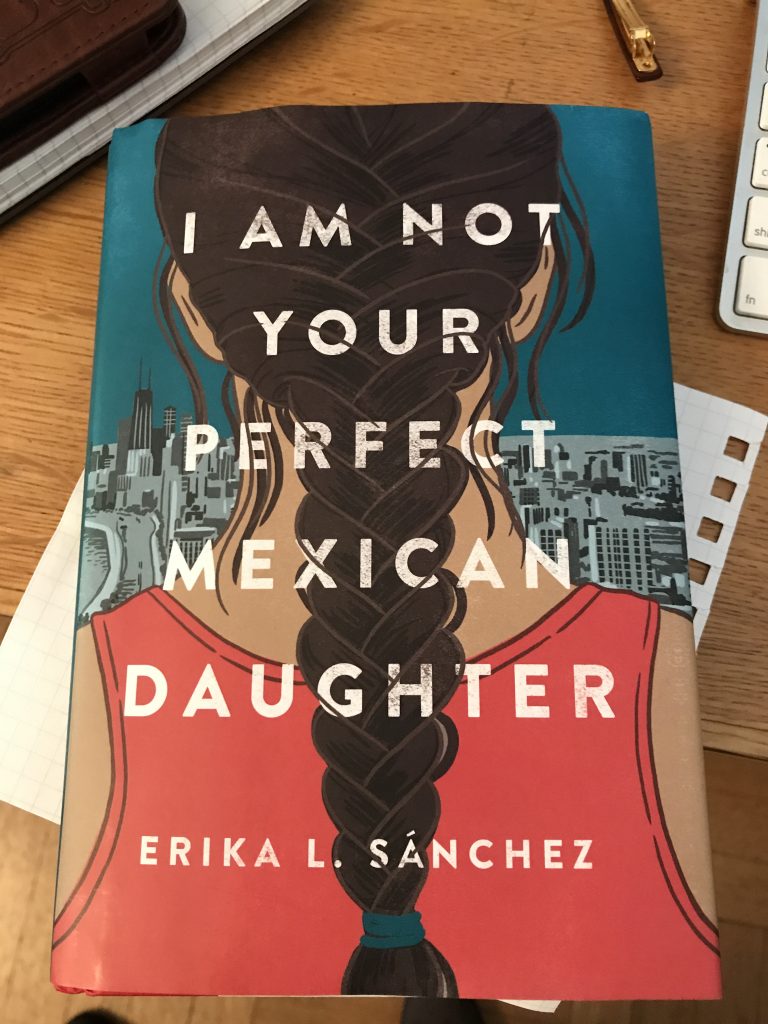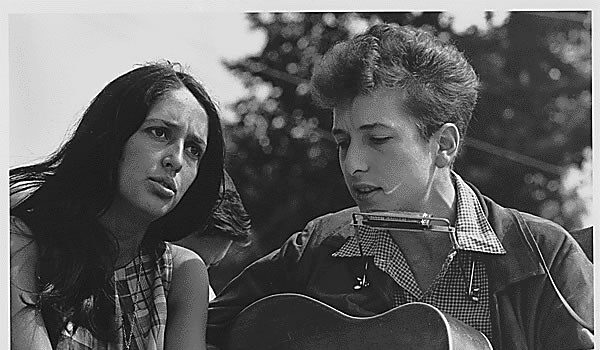I Am Not Your Perfect Mexican Daughter
Lorea Canales
I Am Not Your Perfect Mexican Daughter
by Erika L. Sánchez (Alfred A. Knopf 2017)
I Am Not Your Perfect Mexican Mother
I often wear my hair in a thick braid like the drawing on the cover of Erika Sanchez’ book. I do not think of it as a particular Mexican trait when I do it, it is just what I do. Where does personal identity begin and national traits end? No one I know braids her hair like this, but I do, I have a thick heavy braid. Would I braid it like this if I wasn’t Mexican? I don’t know.
Like the narrator Julia (pronounced Whoo-li-a) in Erika L. Sanchez’s book, I used to love going to bookstores and browsing. Where I grew up, in Monterrey, Mexico, we had no used book stores and only one pretty awful bookstore inside a mall which sold mostly textbooks, Librerias Castillo. It was quite uninspiring. Luckily, the school I attended had a well stocked library and I spent all my time there. When we traveled to Mexico City, my mother would take us to the original Libraries Gandhi in Coyoacán, and we would roam excitedly between the disorganized tables of books finding treasures. Libraries, books, bookstores, that is where I wanted to be. Unlike Julia, I am not a book smeller, I don’t know why, never got into it. I miss bookstores, I remember going in looking for a particular title and coming out with three books I had no idea I needed to read. I found Doris Lessing like that, I bought The Fifth Child when it just came out, off the shelf, having no idea she was well known. We did not study Doris Lessing in school. I like how books arrive to us, recommendations, gifts, a cover… I would open the pages at random and see if the writing trapped me. Books arrive in fortuitous and cherished ways.
Reading the New York Times online, I come across a book review, of a poet Layli Long Soldier, she is Native American and her book is called Whereas; she speaks of loss, displacement. I read the author’s byline, her name is Natalie G. Diaz, also a poet, her book is called When My Brother Was an Aztec. I am looking for books to help me describe my experience as a Mexican, as an Immigrant, as a member of a tribe. I log on to twitter and follow Natalie G. Diaz, because I must. How can I not? And then, there is this tweet, a YA Book, in the New York Times´ Bestselling list, I Am Not Your Perfect Mexican Daughter. The title makes me laugh. I have been having quite a week with my teenage daughters, perhaps this is a good book for us. This past summer their school had them read Mexican White Boy by Matt de la Peña and I read it too. So I am on a roll.
As a Mexican writer living in New York, I am interested in what Mexicans or Mexican Americans write. What are their experiences? How are we presenting ourselves to non-Mexicans or non-Mexican-Americans? “We”? I know, it is problematic. Who is this “we”? Mexicans? People of Mexican descent? Our individual experiences are as diverse as anything and yet, we share a common language, and common stories. With Julia, the teenage “imperfect daughter”, I shared not only my braid, love of books and tendency of being a sour smart-ass, but also eating chips drenched in lime juice, knowing who La Llorona is, Juan Gabriel, attending Quinceañeras, eating tortillas at home, a certain kind of morality or expectations. We both think the fluffy quinceañera dresses are tasteless although Julia goes as far as believing “They should be classified as crimes against humanity.” She knows who “Cepillín” is “that scary Mexican clown who looks like a rapist but everyone loves for some reason.” Anyone who knows who Cepillín is, is my kin -we share a dialect.
My upbringing in the modern and industrial Monterrey, in one of the posh suburbs of Mexico and Latin America (San Pedro Garza Garcia) could be seen as opposite from Julia’s and yet, so many things bring us together. She sprinkles the book with broader cultural references. “The apartment feels like the play The House of Bernarda de Alba but much less interesting.” Mentioning a film like “The Red Balloon” makes her character who we already know is book smart, worldly. It is finally through culture which we access this broader world, it allows us to leave the neighborhood, whatever that was. There is a scene in which her English teacher goes on to explain why he cares for them to learn standard English. “See, I am teaching you standard English, which is the language of power.” “I want you to leave this class with the tools to compete with kids in the suburbs, because you’re just as capable, just as smart.” And Julia never seems to doubts that.
Sanchez´s novel is bold, not only her character is a true heroine -albeit one who struggles with depression. She doesn’t shy away neither from language, tough subjects -rape, death, narcos, la Santa Muerte- or the incredibly precarious experience of immigrants. The father of her best friend died crossing the Arizona border. “This coyote took all their money and then abandoned the entire group of mojados while they walked through the desert. They got lost for two days, and the seven in the group, including a baby, eventually died of thirst.” In a beautiful passage where Julia is talking to her teacher about college admissions, he says she shouldn’t call her parents illegal, he believes that term is demeaning, worse even is illegal alien. Julia then says, “My family call themselves ilegales or mojados. No one says undocumented. They don’t know about being politically correct.”
Like Julia’s, my parents expected me to live in their home while I attended college, which I did, and so did most of my friends. There was never much discussion about what kind of career or work we would do, as a woman your job was to marry, have children and take care of the house.
I’ve never experienced an empty kitchen and was moved by her being frustrated because she couldn’t even have a peanut butter sandwich. She is so earnest in her desire. Like her, I have experienced more than my fair share of cockroaches. The details in the novel are all authentic, this is refreshing, there is no cultural appropriation going on, she is a real Mexican American, who has deep ties to Mexico and the Mexican community. She is also atypical in the sense that she is bookish, fierce and independent. Julia’s voice is the true treasure of this novel. Sánchez balances a tough juggling act, the book is a bit of a detective novel but not too much, a bit of a romance, but not too much, a bit of a sisterhood story, but not too much, a bit coming of age… in all, the balance is quite satisfying, like a good taco drank with jamaica water should be.
Julia is an authentic free thinker, who goes through the world figuring things out, not only unashamed of her thoughts, but confident in them -she is not confused about her opinions. By making her unique, Erika gives permission for all of “us” to be unapologetically ourselves.
Erika Sanchez is also a poet and her use of language is one of the richness of the book. Julia feels “spiritually nauseated.” In the mornings, she is “a shred of a person.” When she helps her mother clean houses, she meets Dr. Sheinberg, who uses the word propitious. “I know what that means, of course -I read duh- but why would you use words like that with a Mexican cleaning lady. As Mr. Ingman says, “Know your audience.”
I wince at imagining Julia’s experience at NYU. Will her writer group respect her writing? Will the city, famously expensive, make her feel poorer, despite her full ride scholarship? I am afraid they will darle en la madre, but I have hope for her. Erika L. Sanchez certainly triumphed, Julia can too.
 Lorea Canales is a lawyer, journalist, translator, and novelist from Mexico. Becoming Marta, was published by Amazon Crossings, 2016. She has an LLM from Georgetown Law, worked in Washington, DC, and Mexico before joining the newspaper Reforma. In 2010, Canales received an MFA from NYU. She published her novel Apenas Marta in 2011 and Los perros in 2013 with Random House.Her Twitter is @loreac
Lorea Canales is a lawyer, journalist, translator, and novelist from Mexico. Becoming Marta, was published by Amazon Crossings, 2016. She has an LLM from Georgetown Law, worked in Washington, DC, and Mexico before joining the newspaper Reforma. In 2010, Canales received an MFA from NYU. She published her novel Apenas Marta in 2011 and Los perros in 2013 with Random House.Her Twitter is @loreac
©Literal Publishing.
Posted: June 6, 2018 at 10:39 pm










